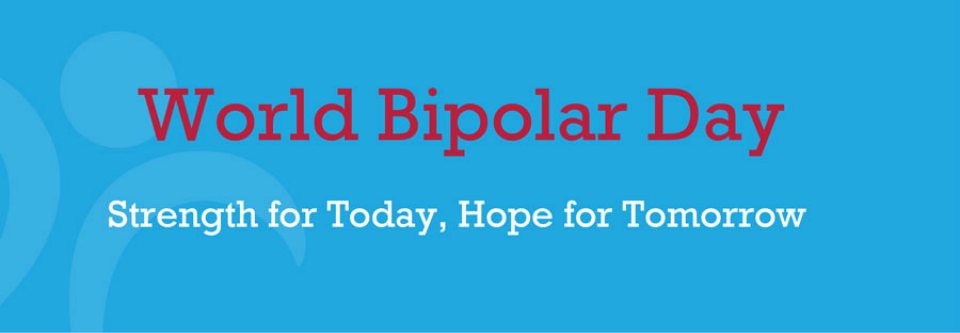World Bipolar Day (WBD) is celebrated on March 30th, the birthday of Vincent Van Gogh, who was posthumously diagnosed as probably having bipolar disorder. The vision of WBD is to bring world awareness to bipolar disorders and eliminate social stigma. Through international collaboration the goal of World Bipolar Day is to bring the world population information about bipolar disorders that will educate and improve sensitivity towards the illness.
Bipolar disorder is a brain disorder that causes unusual shifts in mood, energy, activity levels, and the ability to carry out day-to-day tasks. Symptoms of bipolar disorder are severe and different from the normal ups and downs that everyone goes through from time to time. It is estimated that the global prevalence of bipolar disorder is between 1 and 2% and has been said to be as high as 5%.
While growing acceptance of bipolar disorder as a medical condition, like diabetes and heart disease, has taken hold in some parts of the world, unfortunately the stigma associated with the illness is a barrier to care and continues to impede timely diagnosis and effective treatment. To address the disparity in how bipolar disorder is viewed in different parts of the world, the International Society for Bipolar Disorders (ISBD), the International Bipolar Foundation (IBPF), and the Asian Network of Bipolar Disorder (ANBD), came together to work on the concept of a world bipolar day.
Today, bipolar disorder is a mental illness that remains a significant challenge to patients, health care workers, family members and our communities. In the US alone, Bessonova et al. conclude in a 2020 systematic review of the economic burden of bipolar disorder in the US that “The estimated total annual national economic burden of BD/BD-I was more than $195 billion, with approximately 25% attributed to direct medical costs.”
To date, over 220 events from over 53 countries have been reported to the ISBD since the inception of World Bipolar Day on March 30th, 2014, though this likely represents only a minority of the efforts from individuals and other groups to raise awareness of bipolar disorder in connection with this campaign. Some thoughts on the importance of WBD from ISBD members are included below.
"WBD represents the quintessential opportunity for the people with lived experience of the illness to interact with their communities and bring awareness about bipolar disorder to different levels of society.”
– Manuel Sanchez de Carmona, MD, Past President ISBD and ISBD Board Member
"World Bipolar Day is a day for us to unite. A day to celebrate the remarkable strengths, achievements, and resilience of people with lived experience of bipolar disorder. It's also a day for us to come together to empower change. To advance bipolar disorders research, care systems and advocacy, and, critically, to reduce the significant stigma and discrimination people with bipolar disorder can face".
– Erin Michalak, PhD, ISBD Vice President for Outreach
To learn more about Vincent Van Gogh please click here: Vincent Van Gogh Bio
Bipolar disorder is a brain disorder that causes unusual shifts in mood, energy, activity levels, and the ability to carry out day-to-day tasks. Symptoms of bipolar disorder are severe and different from the normal ups and downs that everyone goes through from time to time. It is estimated that the global prevalence of bipolar disorder is between 1 and 2% and has been said to be as high as 5%.
While growing acceptance of bipolar disorder as a medical condition, like diabetes and heart disease, has taken hold in some parts of the world, unfortunately the stigma associated with the illness is a barrier to care and continues to impede timely diagnosis and effective treatment. To address the disparity in how bipolar disorder is viewed in different parts of the world, the International Society for Bipolar Disorders (ISBD), the International Bipolar Foundation (IBPF), and the Asian Network of Bipolar Disorder (ANBD), came together to work on the concept of a world bipolar day.
Today, bipolar disorder is a mental illness that remains a significant challenge to patients, health care workers, family members and our communities. In the US alone, Bessonova et al. conclude in a 2020 systematic review of the economic burden of bipolar disorder in the US that “The estimated total annual national economic burden of BD/BD-I was more than $195 billion, with approximately 25% attributed to direct medical costs.”
To date, over 220 events from over 53 countries have been reported to the ISBD since the inception of World Bipolar Day on March 30th, 2014, though this likely represents only a minority of the efforts from individuals and other groups to raise awareness of bipolar disorder in connection with this campaign. Some thoughts on the importance of WBD from ISBD members are included below.
"WBD represents the quintessential opportunity for the people with lived experience of the illness to interact with their communities and bring awareness about bipolar disorder to different levels of society.”
– Manuel Sanchez de Carmona, MD, Past President ISBD and ISBD Board Member
"World Bipolar Day is a day for us to unite. A day to celebrate the remarkable strengths, achievements, and resilience of people with lived experience of bipolar disorder. It's also a day for us to come together to empower change. To advance bipolar disorders research, care systems and advocacy, and, critically, to reduce the significant stigma and discrimination people with bipolar disorder can face".
– Erin Michalak, PhD, ISBD Vice President for Outreach
To learn more about Vincent Van Gogh please click here: Vincent Van Gogh Bio



